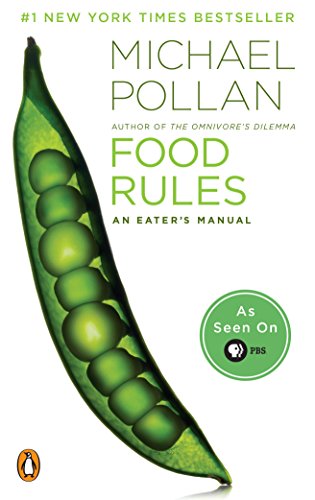Michael Pollan, tall, fit, not quite skinny but very definitely lean, is holding a fruit yoghurt in one hand and a bottle of Coca-Cola in the other.
"So," he says, "which do you think, per 100 grammes, contains more sugar?" The Coke, I reply. Duh. "Wrong," he says. "The yoghurt. And look, it’s low-fat. Isn’t that great? We’re getting fat on low-fat food."
 Food Rules: An Eateru2...
Best Price: $0.99
Buy New $4.29
(as of 09:25 UTC - Details)
Food Rules: An Eateru2...
Best Price: $0.99
Buy New $4.29
(as of 09:25 UTC - Details)
It’s a nice illustration of Rule Nine in Pollan’s magnificently sensible new book, Food Rules. Along with such gems as "Don’t eat anything your great-grandmother wouldn’t recognise as food," "avoid food products containing ingredients no ordinary human would keep in the pantry," and "don’t get your fuel from the same place your car does," Pollan recommends: "avoid food products with the wordoid ‘lite’ or the terms ‘low-fat’ or ‘non-fat’ in their names."
His reasoning: if you remove the fat from a foodstuff, it doesn’t necessarily make it non-fattening. Certainly not if the producer ratchets up the sugar content to compensate for the flavour that vanished along with the fat. In fact, Pollan notes, since Americans – and hence most of the rest of us in the west – began producing and eating low-fat food products, we’ve actually been consuming up to 500 extra calories a day. Brilliant.
Pollan, award-winning author, journalist and campaigner, is on a mission. Food Rules is, in effect, a condensation of his previous work: much of the science behind these 64 simple, deliberately catchy injunctions ("The whiter the bread, the sooner you’re dead") towards a healthier diet made up of real, honest food has already been expertly – and readably – dissected in works like The Omnivore’s Dilemma and the US bestseller In Defense of Food.
 The Omnivoreu2019s Dil...
Best Price: $1.49
Buy New $6.92
(as of 09:20 UTC - Details)
The Omnivoreu2019s Dil...
Best Price: $1.49
Buy New $6.92
(as of 09:20 UTC - Details)
The Rules spring from two unarguable facts (facts so unarguable, in fact, that even the biggest food multinational would have trouble contesting them). The first is that people who eat what Pollan defines as a Western diet ("lots of processed food and meats, lots of added fat and sugar, lots of everything except vegetables, fruits and whole grains") tend to suffer from Western ailments: obesity, type 2 diabetes, cardiovascular disease, and cancer.
 In Defense of Food: An...
Best Price: $1.23
Buy New $7.99
(as of 09:25 UTC - Details)
In Defense of Food: An...
Best Price: $1.23
Buy New $7.99
(as of 09:25 UTC - Details)
The second is that people who don’t, people who eat more traditional diets – including diets like those of certain indigenous peoples which by the lights of Western food science might be considered way too high-fat, high-carb or high-protein – do not tend to suffer from these diseases. In other words, human beings can cope with, can indeed thrive on, a wide variety of foods and diets, with one major exception: the diet most of us in the west are now eating.
So why are we all eating ourselves to death? Because for big food manufacturers, the Western diet is payday, every day. "The more a food is processed, the more profitable it gets," says Pollan. And that status quo is not challenged by modern food science, which is all about identifying the "good" and "bad" nutrients in processed foods and tinkering with them – by lowering the fat, for example, or boosting the vitamins – rather than questioning the value of processed food products in the first place.
"We don’t talk about food any more," says Pollan. "We talk about nutrients: omega-3, antioxidants, saturated fats, polypenols. And so we play into the hands of the food marketers – it all becomes one great big beautiful game."
The world of processed food, he observes, is truly a marketer’s dream: "You can tweak it, reformulate it and reposition it ad infinitum. And every time, you make money." (Which explains Rule 11: "Avoid foods you see advertised on the television". Simply, since only the biggest food manufacturers can afford TV advertising, and more than two-thirds of TV food ads promote processed foods, declining to buy any food product backed by a big advertising budget means you’re unlikely to ingest what Pollan charmingly terms "edible foodlike substances".)
July 6, 2010





